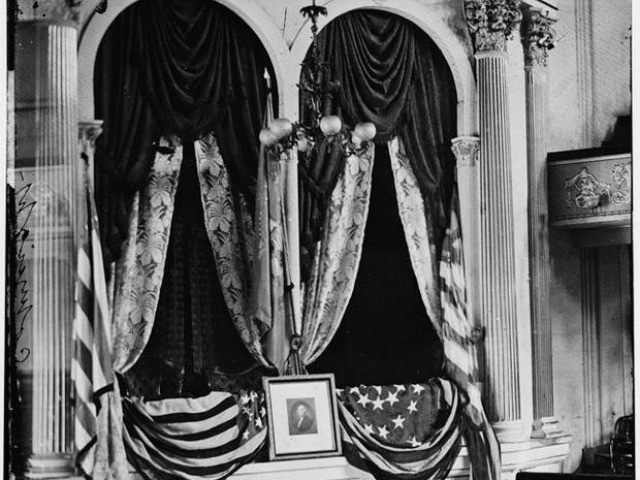On the night Abraham Lincoln was shot, April 14, 1865, Associated Press correspondent Lawrence Gobright scrambled to report from the White House, the streets of the stricken capital, and even from the blood-stained box at Ford’s Theatre, where, in his memoir he reports he was handed the assassin’s gun and turned it over to authorities. Here is an edited version of his original AP dispatch:
___
WASHINGTON, APRIL 14 — President Lincoln and wife visited Ford’s Theatre this evening for the purpose of witnessing the performance of ‘The American Cousin.’ It was announced in the papers that Gen. Grant would also be present, but that gentleman took the late train of cars for New Jersey.
The theatre was densely crowded, and everybody seemed delighted with the scene before them. During the third act and while there was a temporary pause for one of the actors to enter, a sharp report of a pistol was heard, which merely attracted attention, but suggested nothing serious until a man rushed to the front of the President’s box, waving a long dagger in his right hand, exclaiming, ‘Sic semper tyrannis,’ and immediately leaped from the box, which was in the second tier, to the stage beneath, and ran across to the opposite side, made his escape amid the bewilderment of the audience from the rear of the theatre, and mounted a horse and fled.
The groans of Mrs. Lincoln first disclosed the fact that the President had been shot, when all present rose to their feet rushing towards the stage, many exclaiming, ‘Hang him, hang him!’ The excitement was of the wildest possible description…
There was a rush towards the President’s box, when cries were heard — ‘Stand back and give him air!’ ‘Has anyone stimulants?’ On a hasty examination it was found that the President had been shot through the head above and back of the temporal bone, and that some of his brain was oozing out. He was removed to a private house opposite the theatre, and the Surgeon General of the Army and other surgeons were sent for to attend to his condition.
On an examination of the private box, blood was discovered on the back of the cushioned rocking chair on which the President had been sitting; also on the partition and on the floor. A common single-barrelled pocket pistol was found on the carpet.
A military guard was placed in front of the private residence to which the President had been conveyed. An immense crowd was in front of it, all deeply anxious to learn the condition of the President.
It had been previously announced that the wound was mortal, but all hoped otherwise. …
At midnight the Cabinet, with Messrs. Sumner, Colfax and Farnsworth, Judge Curtis, Governor Oglesby, Gen. Meigs, Col. Hay, and a few personal friends, with Surgeon General Barnes and his immediate assistants, were around his bedside.
The President was in a state of syncope, totally insensible and breathing slowly. The blood oozed from the wound at the back of his head. The surgeons exhausted every effort of medical skill, but all hope was gone.
The parting of his family with the dying President is too sad for description.
The President and Mrs. Lincoln did not start for the theatre until 15 minutes after 8 o’clock. Speaker Colfax was at the White House at the time, and the President stated to him that he was going, although Mrs. Lincoln had not been well, because the papers had announced that he and General Grant were to be present, and as Gen. Grant had gone North he did not wish the audience to be disappointed. He went with apparent reluctance, and urged Mr. Colfax to go with him, but that gentleman had made other arrangements …
(Here follows a lengthy description of the simultaneous assassination attempt on Secretary of State William Seward that left him wounded.)
Secretaries Stanton and Welles and other prominent officers of the government called at Secretary Seward’s house to inquire into his condition, and there heard of the assassination of the President.
They then proceeded to the house where the President was lying, exhibiting, of course, intense anxiety and solicitude.
An immense crowd was gathered in front of the President’s house (the White House), and a strong guard was also stationed there, many persons supposing that he would be brought to his home.
The entire city to-night presents a scene of wild excitement, accompanied by violent expressions of the profoundest sorrow. Many shed tears.
The military authorities despatched mounted patrols in every direction, in order, if possible, to arrest the assassins. The whole metropolitan police are likewise vigilant for the same purpose. …
Vice President Johnson is in the city headquarters, and guarded by troops.
(Lincoln’s death at 7:22 a.m. on April 15 was reported by Secretary of War Edwin Stanton.)
EDITOR’S NOTE _ On the night Abraham Lincoln was shot, April 14, 1865, Associated Press correspondent Lawrence Gobright scrambled to report from the White House, the streets of the stricken capital, and even from the blood-stained box at Ford’s Theatre, where, in his memoir he reports he was handed the assassin’s gun and turned it over to authorities. Here is an edited version of his original AP dispatch.

COMMENTS
Please let us know if you're having issues with commenting.